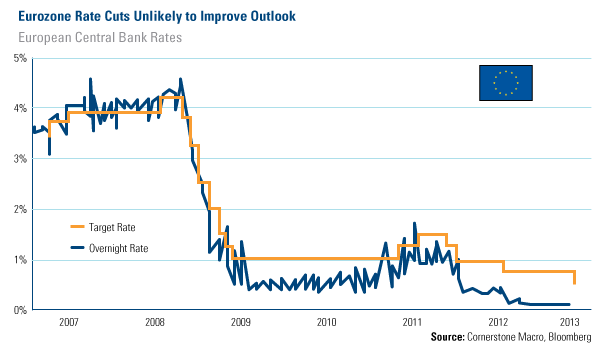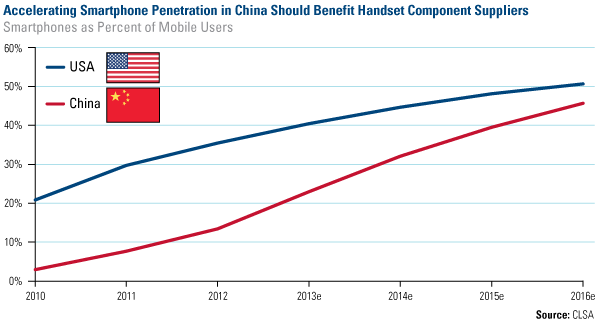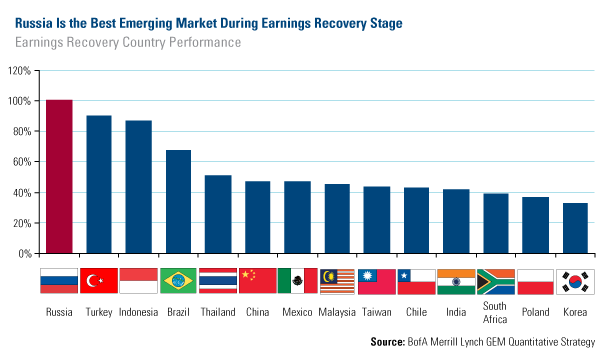Emerging Markets Radar (May 6, 2013)
Strengths
- China had allocated Rmb200 billion investment in railway projects for the first quarter, equal to the total investment in 2012. Railway infrastructure investment is on the way to reach the annual budget of Rmb530 billion for 2013. It is believed May and June will be active months for new project tendering. Finally, industry professionals predict China railway network will remain fast expansion even post 2015.
- CEBM, an economic research firm in China, said in its survey flash that further recovery in China is observed among industrial sectors. The CEBM Industrial Sales versus Expectation Index rebounded to 10.6 percent in April from 6.4 percent in March and -13.1 in February. CEBM has been less bullish than investment banks in the last few years before publishing this bullish report.
- Macau April gaming gross revenue rose 13.2 percent year-over-year to MOP28.3 billion.
- S&P upgraded Philippines sovereign credit from BB+ to investment grade BBB-, citing structural growth potential and sustainable current account surplus.
- The Thailand private consumption index was up 3.7 percent year-over-year in the first quarter. Exports gained 3 percent quarter-over-quarters, and current account surplus was $1.9 billion versus consensus of $1.55 billion.
- The China government intends to approve RMB200 billion of additional Renminbi Qualified Foreign Institutional Investor (RQFII) quota by year end.
- Hong Kong loan growth was 10.5 percent year-over-year, and 3.1 percent quarter-over-quarter in the first quarter. System loan-to-deposit ratio (LDR) was 68.7 percent.
- Korean April CPI was at its eight-month low of 1.2 percent, leaving room for easing monetary policy.
- Credit demands are still strong in Association of Southeast Asian Nations (ASEAN) countries. In Indonesia, loans rose 23.4 percent in February; Thai bank loans improved 14.3 percent year-over-year in February; Philippine commercial banks’ February customer loans increased 15.1 percent.
- In Thailand, headline CPI was 2.42 percent versus the estimate of 2.7 percent in April; core CPI was 1.18 percent versus the estimate of 1.3 percent. This might prompt a rate cut in the next central bank policy meeting.
- Optimism in Turkey continued this week with strong gains in the equity market and record lows on the country’s two-year benchmark bond yields. Advances in the peace process with Kurdish militants increased speculations of a second credit-rating upgrade this year. In addition, annual inflation dropped to 6.13 percent in April, a significant decrease from the previous months. Lastly, the auction for the Third Istanbul Airport, which began with EUR4 billion bids by multiple local and foreign construction groups for the 25 year operational rights, was quickly bid up to EUR22.13 by a consortium of five closely held constructors. The winning bid was significantly higher than previously predicted and serves to demonstrate the value proposition the country offers to investors.
- On Monday the Chilean budget direction office reported a fiscal budget surplus of $2.42 billion for the quarter ended March 31. This number corresponds to an estimated 0.8 percent of GDP. The number signals a decrease from a year ago mainly attributed to an increase in government expenditures and lower tax receipts from copper production. However, the decline was contained by growing industrial production, with large increases in mineral production to offset price declines. The rapid adaptation of the Chilean economy to the current macroeconomic challenges is truly commendable.
Weaknesses
- China official April PMI was 50.6, just slightly lower than market consensus of 50.7 and 50.9 in March, which shows the economy is expanding at a slower speed.
- Hong Kong March retail sales grew 9.8 percent year-over-year, lower than the consensus expectation of 14.7 percent. Hong Kong had restricted the amount of infant formula mainland travelers can buy to bring home, which had caused stagnant baby food sales and slowed retail sales growth in general. A story was told that a woman was caught as a “smuggler” at the border back to Mainland China by carrying 1.8 kilos of infant milk powder earlier this year.
- S&P downgraded Indonesia sovereign credit rating to BB+/stable from BB+/positive, saying “the stalling of the reform momentum in Indonesia and weaker external profile has diminished the potential for an upgrade over the next 12 months.”
- Moody’s cut Slovenia’s sovereign credit rating by two notches from Baa2 to Ba1, effectively downgrading the country from investment grade to speculative grade. The justification given was Moody’s centered on the uncertain funding environment for a nation with undercapitalized banks and a deteriorating government balance sheet. Despite the downgrade, the country went ahead with a planned debt offering at roughly the same yields as forecast before the rating change. S&P and Fitch maintain investment grade ratings for the country.
- Brazil posted a trade balance deficit of $994 million in April, the third monthly deficit in four months, and brings the cumulative 2013 trade balance to a $6.15 billion deficit. The number compares to a $3.3 billion surplus for the same period in 2012. Imports have risen 10 percent for the year, driven by a 28 percent surge in fuel imports. On the other hand, exports suffered a large monthly decline led by a 20 percent decrease in oil exports to the United States. Surprisingly, the argument of weakness in China that has been used recently to justify the Brazilian underperformance finds itself without merit as exports to China grew 5.9 percent in the first four months of the year.
Opportunities
- As shown in the graph above, smartphone penetration in China as a percentage of total mobile phone users is much lower than that in the U.S. The smartphone market is one of the fastest growing sectors in China today. CLSA expects China’s 3G smartphone users to double this year to 300 million, with penetration reaching 23 percent of mobile subs, versus 40 percent in the U.S. Consumer goods and services providers in China are now focusing on developing smartphone platforms to monetize their search and social network. Suppliers of smartphone components are benefiting from growing smartphone penetration in China.
- JP Morgan published a clever note on Russia highlighting reasons why it may be worth looking back into a market many have been bearish on for decades. It lists basics, such as the fact that Russia is very cheap; the country’s main index trades at 5.7x trailing earnings, and extremely low multiples on a forward basis. Later Bank of America published a report noting Russia’s imminent release of its monetary firepower will find added effectiveness under a bullish global equity backdrop where emerging markets can thrive. Perhaps, with the positive U.S. jobs report today and the earnings recovery taking place, it is time turn around and head back into Russia.
- Mexico recently reported a $3.27 billion fiscal surplus for the first three months of 2013, as well as $6 billion in Japanese foreign direct investment over the last eight quarters. It can only be expected for this strength to give momentum to the economy and build on the competitiveness platform President Pena Nieto is submitting to Parliament. In addition, President Obama is on an official visit to Mexico this week and, despite the fact that the President is visiting mainly to discuss immigration and security, the trip presents an opportunity to touch on other bilateral items in the agenda such as immigration and trade.
Threats
 click to enlarge
click to enlarge
- China Premier Li Keqiang is considering cutting 2014’s GDP growth target from 7.5 percent to 7 percent, reported by MNI. Although 7 percent is high, the market may have expected 7.5 percent growth for a very long time.
- The ECB cut its benchmark lending rate by 25 basis points this week for the first time since July 2012.The rate, which now sits at 50 basis points, does not seem to have the relevance to open the lending channels and make the current situation any better. The banks, both in core countries as well as in eastern Europe are set to benefit from a decrease in the lending rate which could help expand their net interest margins; however, as the chart below demonstrates, the overnight rate has been close to 10 basis points for several months now. Thus, the ECB rate cut will have a reduced, if any, effect on motivating lending. The feeling that the ECB is running out of monetary tools to boost growth is prevalent.
- Pressure on the Argentine peso is strengthening as the parallel rate in the black market continues to rise. There has been renewed speculation on the implementation of a dual currency regime to avoid the depletion of the nation’s foreign reserves. But, as Deutsche Bank notes in its Latin American Economic Summary, it is not expected for President Kirchner to risk the fragile political equilibrium with such a policy initiative before the October midterm elections. The uncertainty with regards to the peso disrupts the efficient deployment of capital and prevents the economy from reaching its full potential.












